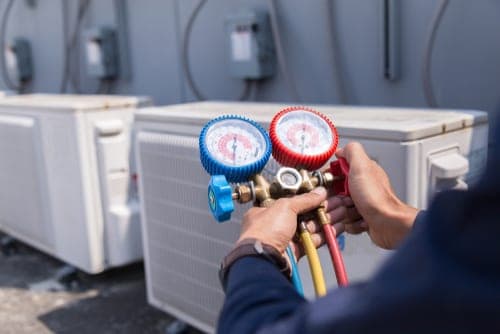Energy-Efficient Cooling And Heating Solutions to Minimize Utility Expenses
As energy prices remain to climb, the relevance of energy-efficient heating and cooling systems comes to be progressively evident. These systems not just promise substantial cost savings on utility bills yet also add to an extra lasting future by lessening power usage. With numerous alternatives offered, consisting of geothermal heatpump and ductless mini-splits, homeowner face a wide variety of options that can improve comfort and air top quality. Nonetheless, understanding the essential features and upkeep demands is necessary to making best use of these benefits. What elements should be focused on when choosing the right system for your demands?
Advantages of Energy-Efficient HVAC Solutions
Energy-efficient a/c systems use countless advantages that extend beyond plain cost financial savings. One substantial advantage is the reduced environmental influence. By consuming much less power, these systems add to lower greenhouse gas exhausts, assisting to battle climate modification and promote sustainability. This lines up with raising societal demands for environmentally friendly practices in residential and industrial setups.
Additionally, energy-efficient a/c systems frequently supply improved convenience degrees. A lot of these systems include sophisticated modern technology that enables much better temperature control and enhanced air high quality (DMAKS HVAC). This leads to a healthier indoor environment, which is particularly important for individuals with allergies or breathing issues
Additionally, investing in energy-efficient heating and cooling systems can improve building worth. As more consumers prioritize energy performance, homes and buildings equipped with these systems might draw in higher bids in the actual estate market.
Kinds of Energy-Efficient Heating And Cooling Options
Exactly how can house owners and organizations select one of the most suitable energy-efficient a/c choices for their needs? The marketplace uses a range of energy-efficient heating and cooling systems, each created to enhance convenience while lessening energy intake.
One choice is the variable refrigerant circulation (VRF) system, which effectively regulates the temperature level in multiple zones within a structure. This system adjusts its refrigerant circulation to match the desired temperature, resulting in significant power savings.
An additional popular selection is geothermal heatpump, which utilize the planet's stable temperature level to warmth and great spaces. By moving heat to and from the ground, these systems demonstrate impressive performance, particularly in modest environments.
Furthermore, ductless mini-split systems provide an energy-efficient choice for homes doing not have ductwork. These systems allow for zone-specific cooling and heating, decreasing power waste in unoccupied areas.
Last but not least, high-efficiency heaters and ac system, with advanced SEER and AFUE scores, supply dependable environment control while taking in less power than traditional designs. By assessing these choices, homeowners and businesses can choose a cooling and heating system tailored to their particular demands and power effectiveness goals.
Key Functions to Take Into Consideration

Following, investigate the kind of compressor utilized in the system. DMAKS HVAC. Variable-speed compressors can adjust their outcome to match the home heating or cooling need, bring about improved convenience and power cost savings contrasted to single-speed versions. Furthermore, look for systems furnished with smart thermostats that provide programmable setups and remote gain access to, enabling far better control over energy usage
One more important attribute is the system's air filtering ability. High-efficiency click resources filters can boost indoor air high quality and minimize power usage by making sure the system operates successfully. Furthermore, take into consideration the kind of refrigerant utilized; modern systems typically use eco-friendly cooling agents that have a reduced ecological impact.
Lastly, make certain that the system is compatible with zoning technology, which permits customized temperature level control in different locations of your home, enhancing comfort while reducing energy use.
Tips for Choosing the Right System


Following, take into consideration power efficiency rankings, specifically the Seasonal Energy Effectiveness Ratio (SEER) for cooling systems and the Annual Fuel Use Efficiency (AFUE) for heater. Greater scores show higher performance, which can bring about considerable savings on utility expenses with time.
In addition, examine the type of heating and cooling system that best matches your way of living and budget. Choices include central air, ductless mini-splits, and heat pumps, each with its own collection of benefits and downsides.
Do not ignore the value of appropriate installation and sizing; an incorrectly sized system can lead to inefficiencies and enhanced wear. Finally, consult with a specialist HVAC contractor to get experienced suggestions customized to your home's special requirements. This comprehensive strategy will ensure that you select an energy-efficient HVAC system that fulfills your requirements and budget plan properly.
Upkeep for Optimum Efficiency
As soon as the ideal cooling and heating system is in place, ongoing maintenance becomes vital to guaranteeing optimum efficiency and longevity. A well-kept system operates their explanation a lot more efficiently, resulting in lower energy consumption and decreased utility expenses. Routine inspections and tune-ups ought to be set up at the very least two times a year-- once prior to the air conditioning period and as soon as prior to the get redirected here home heating period.

House owners should likewise be watchful regarding monitoring their cooling and heating system's performance. Uncommon noises, changing temperatures, or boosted energy expenses can show underlying issues that need immediate focus. By addressing these worries promptly, property owners can protect against pricey repair services and expand the lifespan of their systems.
Purchasing an upkeep plan with a certified technician not only improves performance yet likewise gives comfort, knowing that the system is operating at its finest. DMAKS HVAC. Normal maintenance is as a result crucial for sustaining energy effectiveness and minimizing overall operational expenses
Final Thought
To conclude, energy-efficient cooling and heating systems present a practical option for lowering energy costs while boosting convenience and air quality. By integrating sophisticated innovations and choices such as geothermal warm pumps and ductless mini-splits, property owners can achieve significant energy savings and add to ecological sustainability. Careful consideration of system functions and continuous maintenance further ensures optimal efficiency, making energy-efficient systems a prudent financial investment for both financial and eco-friendly advantages.